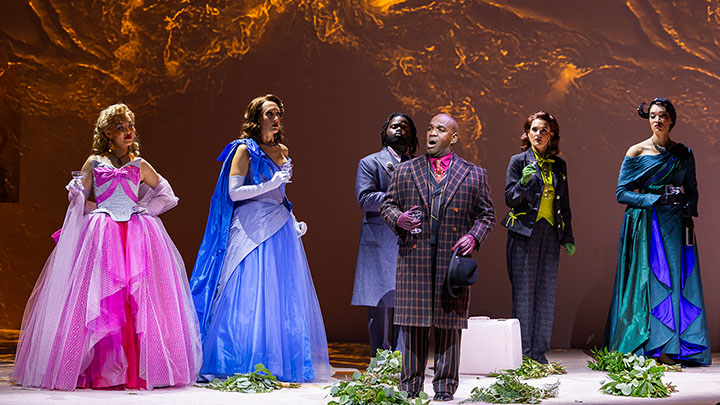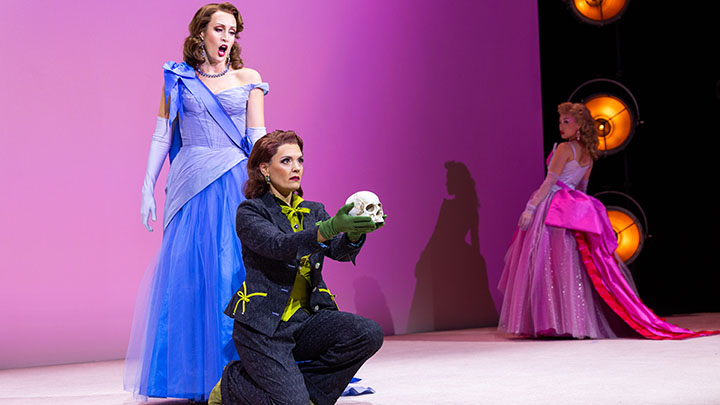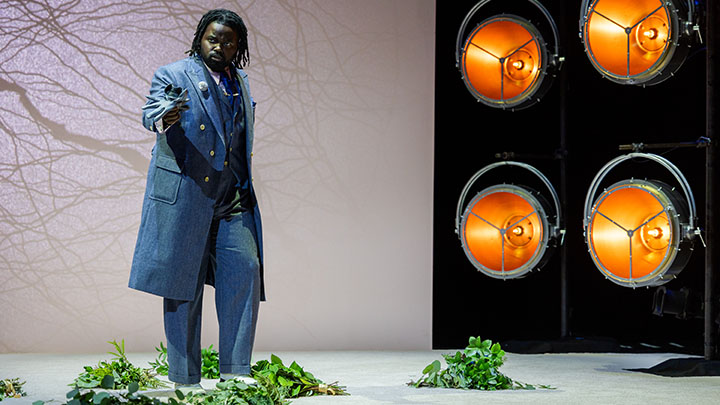In 2022, Yuval Sharon’s La bohème, to a gratifying end, spun the libretto’s acts in reverse order to bring about a more melancholy reverie on Puccini’s opera. Last fall, director Phil Chan’s inaugural stab at Madama Butterfly’s jugular saw a circumspect reimagining not taken far enough to bend the rigid opera around its concept, with stylized subtitles often directly contradicting the opera’s sung text. This season, the company has been attentive to list the librettists of its operas alongside their composers (ie. “Verdi & Ghislanzoni‘s Aida” alongside “Rodgers & Hammerstein‘s Carousel”) on their marketing materials, but with such carelessness on the level of translation, one wonders why they even bother.
This fall’s Mitridate, rè di Ponto, which ran for only two performances last weekend at Emerson College’s Majestic Theatre, was no exception – not only did the subtitles duplicitously debone Vittorio Amedeo Cigna-Santi’s tediously Arcadian libretto, but director James Darrah intervened to tweak the plot and smudge (and fudge) character development without much of a theoretical or musical ‘why.’
Yet despite all that, Mitridate somehow emerged as the most satisfying of the three shows listed above. Mozart’s juvenile opera, an extremely seria and almost uninterrupted procession of glittering, tiresome virtuoso arias, is a work that would much rather tell than show. And tell and tell and tell it does – of the beleaguered king Mitridate during some set of wars in the antique Mediterranean, of his trepidatious betrothed Aspasia, and of his two sons that both are vying for their would-be stepmother’s affections and Mitridate’s presumed-vacant throne. The story cannot yet consistently be found in Mozart’s music, leaving the opera’s characters to circuitously stew, pine, plot, and rage against happenings beyond their control and beyond our view.
But while BLO’s early music puritan neighbors would be horrified at the quantity (and, as some jarringly truncated repeats highlighted, quality) of the company’s cosmetic surgery on an opera usually treated as a Mozart completist curate’s egg (including cutting around half an hour of music, inserting an intermission midway through Act II, and rewriting the subtitles – but not the sung text!– to accommodate gender changes for not one but two characters), the result was, frankly, more appealing than it had any business being and succeeded in selling this highly formulaic work as something with more tang.
I probably show my cards here somewhat when I say that the glimmers of the mature Mozart that we see in Mitridate (especially of Entführung and Così, to say nothing of Clemenza and Idomeneo) are too dim to make the work even a worthwhile conversation partner for the operas that would follow — indeed, it feels like Mitridate has little in common with Tito or Idomeneo besides tessitura. One does not, therefore, I imagine, put on Mitridate to make a case for the work itself, but rather to let the work itself make a case for its interpreters. And it made a splendid case for Lawrence Brownlee.
Watching Brownlee, who sings with such security, incisiveness, and intention, who makes every word count, and whose earnestness only occasionally conflicted with the panoply of negative emotions (rage, wrath, guilt, etc.) Mitridate’s five arias encompass, one couldn’t help but think of what the current moment for coloratura tenors means; Juan Diego Flòrez, the most stylish of the class, has increasingly moved on to concertizing and will take on his first Pollione and Hoffmann later this season, while Javier Camarena is turning his attention increasingly (and uncomfortably, as some clips of his first Duke of Mantua from back in 2017 show) to Verdi.
Exciting new voices – Jack Swanson! Levy Segkapane (whom BLO presented in last season’s Cenerentola)!—are accordingly rushing in as Ramiro and Count Almaviva, but the question of repertoire transition for the 21st century’s inaugural class of bel canto tenors is as awkward as it is pressing. To say nothing of his peers’ approaches, Brownlee’s solution, this Mitridate hints, may be particularly successful. His high notes have lost none of their piquancy, but he declaims with fully supported clarity and his lower notes have a surprising weight to them even if their dynamic range is more limited. A future in Mozart opera seria roles seems bright for such a thoughtful and rigorous artist.
Brownlee was something of a composite of contrasts, highlighting the weak points of his nonetheless solid cast of colleagues who scarcely flagged across the demanding afternoon. The flamboyant Brenda Rae, as Aspasia, warmed up throughout the afternoon, wrestling with a string and punching her acidic tone impressively into the staccati of “Nel grave tormento” while “Pallide ombre” led her further away from her voice’s slender core. She was most effective in the hypnotic (and single) duet “Se viver non degg’io,” opposite the Sifare of Vanessa Goikoetxea, here presented as a woman rather than en travesti (the role was first written for the castrato Pietro Benedetti).
Goikoetxea, though a live wire and an exciting performer with a big, plush voice, lacks much sense of detail and refinement and was the most musically indelicate of her co-stars. The seemingly arbitrary gender change of her character did nothing to help, constricting her to play a member of pantsuit nation on the prowl around Adam Rigg’s simple, wall-to-wall carpeted set in tortured longing for Aspasia. As her brother, Farnace, John Holiday was a more congenial fit to his role; while certain aspects lay beyond his technical capacities (his trill is a jowly wobble), his honky tone is nevertheless emitted with a pleasing evenness and a high note interpolated into his final aria featured a gorgeously floated high note.
Alexis Peart, whose expressive face is matched only by her beguilingly steady and pointed singing, was notable as the territory governor Arbate (the production’s other gender change) while Angela Yam’s distinctive, girlish sound as Farnace’s insistently unmarried fiancé Ismene was complemented by a fine sense of comic timing. Charles Sy was left with one of the Roman guard Marzio’s two arias which he sang with springy, muscular sound.
If Darrah, aided by Molly Irelan’s especially princessy gowns for the women, was able to play onstage, creating a production that was heavy on vibes but benignly incoherent (static at the tail end seemed to suggest we may have just watched a TV show?), conductor David Angus steadied the churning Mediterranean waters in the pit with steady time beating and a uniform smoothness of texture to the BLO Orchestra sound.
Under new artistic leadership (Nina Yoshida Nelsen stepped into the vacant Artistic Director position last year), BLO looks ahead to a season in which Mitridate is its only fully staged opera. While an unexpected choice for the company, its enjoyability will hopefully be a harbinger for more pleasant surprises in the months to come.
Photos: Nile Scott Studios







Comments